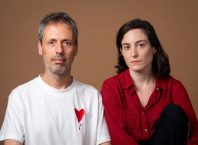By Carl Hoffman
 Tel Aviv’s enormous Central Bus Station is a world unto itself. It is vast—even cavernous in some places, densely populated, and almost totally self-contained. The place has almost everything a person could want or need: food, clothing, liquor, and cigarettes; a supermarket and a drug store; restaurants and video game arcades; tattoo parlors and secondhand bookshops; synagogues and gift shops selling incense and statues of Buddha; drugs, violence, street gangs and sex; art studios and employment agencies; masseurs, manicurists and even fortune tellers flipping Tarot cards.
Tel Aviv’s enormous Central Bus Station is a world unto itself. It is vast—even cavernous in some places, densely populated, and almost totally self-contained. The place has almost everything a person could want or need: food, clothing, liquor, and cigarettes; a supermarket and a drug store; restaurants and video game arcades; tattoo parlors and secondhand bookshops; synagogues and gift shops selling incense and statues of Buddha; drugs, violence, street gangs and sex; art studios and employment agencies; masseurs, manicurists and even fortune tellers flipping Tarot cards.
The place offers just about everything: the sacred and the profane, the ethereal and the mundane; nourishment for the body and succor for the soul. One could live there—indeed, some people do.
No one knows the Central Bus Station or loves the place more than I. With a job in Jaffa, a home in Raanana, and an empty assigned parking space in front of my apartment building that will probably never, ever, see a car, I have meandered through the Central Bus Station twice a day, almost every day, for the past eight years. The city provides few spectacles to equal it in sights and sounds. See it on a Sunday morning, when wave after human wave of boys and girls in army, air force and navy uniforms roll through on their way back to base from a weekend at home. Catch it on a Sunday night and hear the beautiful, staccato cacophony of hundreds of Filipino caregivers—enjoying the last few moments of their “day off”—congregate together to talk, laugh and gossip before returning to their employers’ homes for another week of work. Visit the sixth floor food court and see gangs of kids—white, brown and black—vying with each other to see who can most closely resemble Black Hip Hop musicians from L.A. Stroll through the third floor—with its tattoo parlors, cheap clothes bazaars, felafel stands, bagel bakeries and garishly lit shops selling everything from salted cashews to fake Scotch whiskey, fake Rolex watches to genuinely lethal “hunting knives”—and see, hear, taste and touch an Israel unlike anything you expected when you made aliyah.
Wander anywhere through this colorful colossus and see its most acclimated denizens: beggars—mostly male, mostly old, and all of them Jewish—drifting around the station at all ours of the day and night. Some ask for money; others—too far gone in the head to ask for anything anymore—simply rummage through the trashcans for cigarette butts and food. One elderly gentleman in particular has conspicuously stood out in my field of vision, from the very first day I wandered through the place until the present moment. Short, stooped, and slow moving, he may or may not be very old. Obviously impoverished, he tries nonetheless to appear, well, “professional.” A black cap on his head, he wears a tweed suit jacket, matching pants, a white shirt and a necktie. The clothing is worn and threadbare, but tasteful and always clean. He dresses this way, I suppose, because he is not begging, but “selling.” He carries a handful of small paper packets that contain some sort of facial cosmetics for women. He sells these products, obviously, in much the same way that beggars in the Boston of my childhood used to sit outside Fenway Park before a baseball game and “sell” pencils to passersby. Even so, it really doesn’t matter, as hardly anyone so much as notices him. Most of the people who strut briskly through the Central Bus Station on their way home from work simply veer slightly around the old man—like the water of a mighty river parting slightly as it eddies and flows by a discarded piece of junk sticking up through the surface in the middle of the river. Even I, somehow managing to find a spare shekel to drop into his calloused right palm every time I saw him, never paid much attention to whatever it was he was supposed to be selling with his other hand.
That changed a couple of days ago. As I was coming up on the escalator to the sixth floor, preparing to jump on the 504 bus for home, I saw the old man in the cap and tweed suit and began to search through the tangle of old bus receipts in my pocket for a lone, stray shekel. As I was getting near, I saw a girl—tall, about 20, and in an army uniform—brush by him as she hurried off in the opposite direction. What I saw next, I will remember for the rest of my life. The girl stopped, turned around, and began to walk slowly back to the old man. She smiled and began to speak to him. The old man smiled back, and they both sat down together on a nearby bench. Before I knew what I was looking at, the young girl soldier proceeded to buy—actually buy—three or four of the old man’s packets of cosmetics.
From a safe vantage point but close enough to see, I continued to watch this little drama with growing amazement. The girl, I could see now, was beautiful. With bright, sparkling blue eyes and a flawless peaches-and-cream complexion, this young lady needed the old man’s cosmetics like I need more debt. Yet she sat there and, with her face set in a look of close attention—ignoring the stares and smirks from people sitting nearby—let the old man explain to her how to use the products she was buying. This young girl was giving this sad, impoverished old man both tzedakah and the dignity of being able to act like the salesman he probably once was, instead of the bus station beggar he had become.
It lasted only for a moment. The elderly “salesman” got up and slowly shuffled down the long hall, through the milling hoards of people waiting to board buses that would take them away from this rundown old neighborhood of Tel Aviv. The girl sat for a long moment longer, watched the old man thoughtfully as he disappeared into the crowd, and then gently dropped her “purchases” into a nearby trash can. She then stood up, shrugged her huge, bulky backpack onto her shoulders, and went on her way.
I will never know who this magnificent young woman was, where she came from, or where she was going. I do know, however, that I will take a moment to silently thank her and wish her health, happiness and blessings, every day for the rest of my life.
[Image credit: http://www.flickr.com/photos/chris-yunker/2542338466/sizes/l/]






Dear Carl Hoffman
In your words of a passerby providing your reader with the account of that day, you have painted a picture so rich in color and texture, so vibrant, it turned your description into poetry.
I can inagine a story written of these events – better yet, a script – and I can just picture this beautiful soldier-girl, walking tall back into her world.
Thank you for the moments of pleasure, and the pleasant smile on my face
Chen Sivan
Comments are closed.